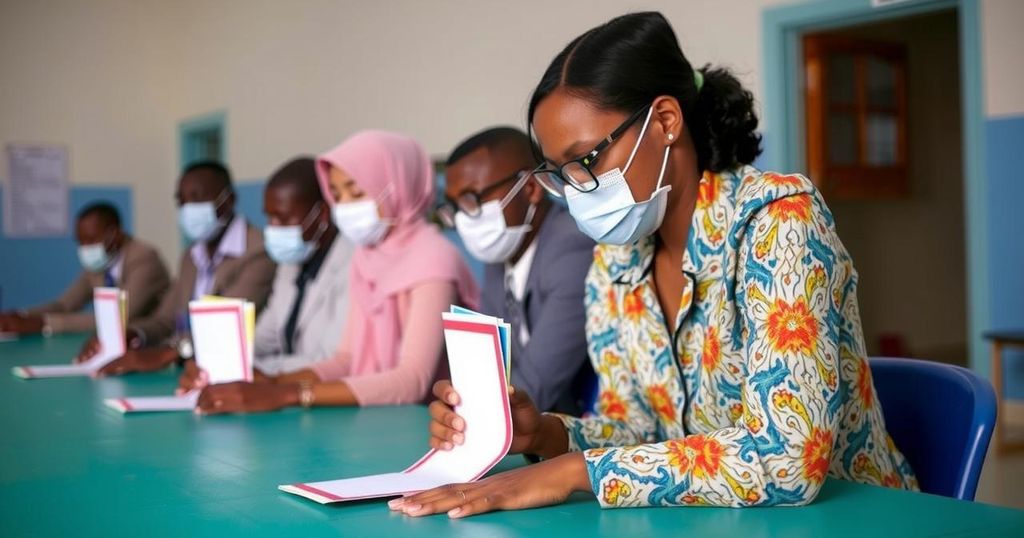Chad Seeks Military Protection Amid Rising Political Violence Ahead of Elections

Chad’s electoral commission is seeking military assistance for the December 29 elections amidst rising violence from opposition supporters against the ruling MPS party. With over 8.3 million registered voters and 180 political parties participating, concerns grow over election integrity amid claims of manipulation by the government. Opposition groups have condemned the situation as a ‘masquerade’ and are calling for a postponement of the elections.
Chad’s electoral commission has sought military assistance to safeguard election officials and candidates in light of rising violence ahead of the elections scheduled for December 29. Reports indicate that opposition supporters have engaged in violent disruptions utilizing clubs and iron bars against the ruling MPS party’s campaign events across various cities. The National Election Management Agency, known as ANGE, has reported increasing hostility towards candidates and attempts to obstruct campaign activities.
Chadian authorities assert that these upcoming elections will conclude a three-year transitional period following the death of former President Idriss Deby in April 2021. Vice President of ANGE, Assane Bairra, cautioned that if the military does not deploy troops, existing tensions may escalate into armed conflicts. Currently, more than 8.3 million of Chad’s 18 million residents have registered to vote. Approximately 180 political parties have nearly 1,300 candidates contesting in the parliamentary elections, with thousands more participating at local council and provincial levels. Additionally, over 1,000 election observers have been accredited to monitor the process.
Nevertheless, a coalition of over 75 opposition parties and civil society organizations have criticized the polls, labeling them a “masquerade.” They assert that President Mahamat Idriss Deby Itno and his Patriotic Salvation Movement aim to solidify their hold on power through these elections. Incidents of violence perpetrated by opposition supporters against MPS campaigners have been reported in several towns, including Ndjamena, Bongor, and Moundou. The military has also intervened to dismantle roadblocks established by opposition members to limit access for MPS campaigners.
Avocksouma Djona, leader of Chad’s Party of Democrats, indicated that his supporters are obstructing campaign activities for both MPS and opposition parties. He expressed a desire for the elections to be postponed, citing that all officials of the elections management board were appointed by Deby, who also influences the constitutional court to declare his party the victor. The constitutional court holds authority for final election results, while ANGE oversees preliminary results.
Deby contested the elections and claimed that the transition to civilian governance would be “fair and transparent,” a statement which opposition groups quickly refuted, alleging that he intends to manipulate the elections to maintain dominance in parliament. Deby assumed leadership as Chad’s transitional president in April 2021 after the death of his father, who held power for thirty years. Though initially pledging an 18-month transition to civilian governance, this period has been extended by two years, raising concerns about the legitimacy of future electoral processes.
The political landscape of Chad has been tumultuous following the death of President Idriss Deby Itno in April 2021, leading to a transitional government led by his son, Mahamat Idriss Deby Itno. The forthcoming elections, set for December 29, aim to transition the country back to civilian rule after a prolonged period of military governance. However, widespread allegations of electoral manipulation and increasing violence have cast doubts on the integrity of the electoral process, with numerous calling for significant reforms and genuine democratic transition.
In summary, the Chadian electoral commission’s request for military protection reflects increasing concerns regarding the safety and integrity of the upcoming elections. The ongoing violence, particularly from opposition supporters against the ruling party, threatens to overshadow the electoral process, which is viewed skeptically by many citizens and political groups. As the transition period nears an end, the capacity for a fair and democratic election remains in question, amidst fears of manipulation and consolidation of power by the ruling authority.
Original Source: www.voanews.com







